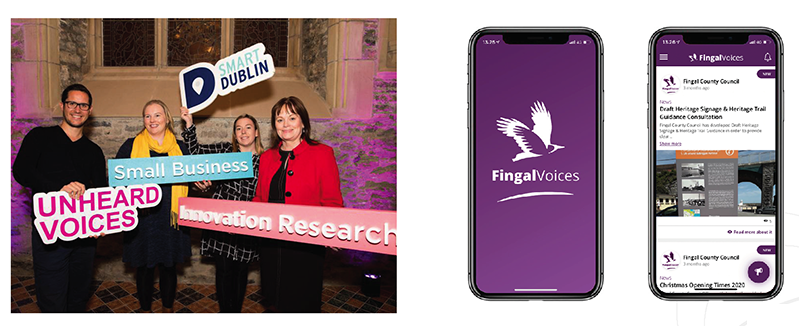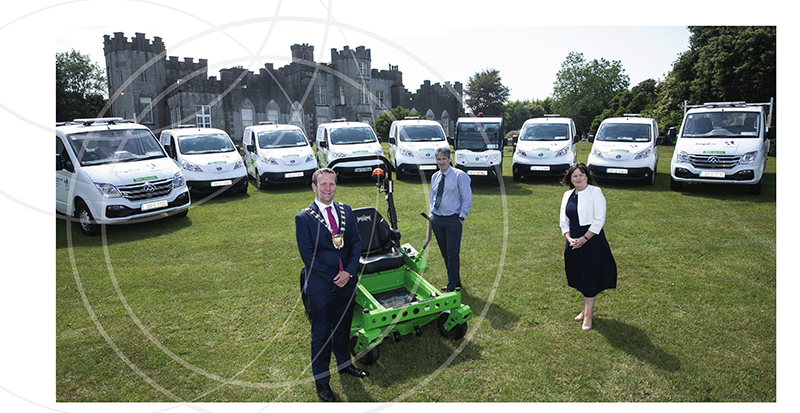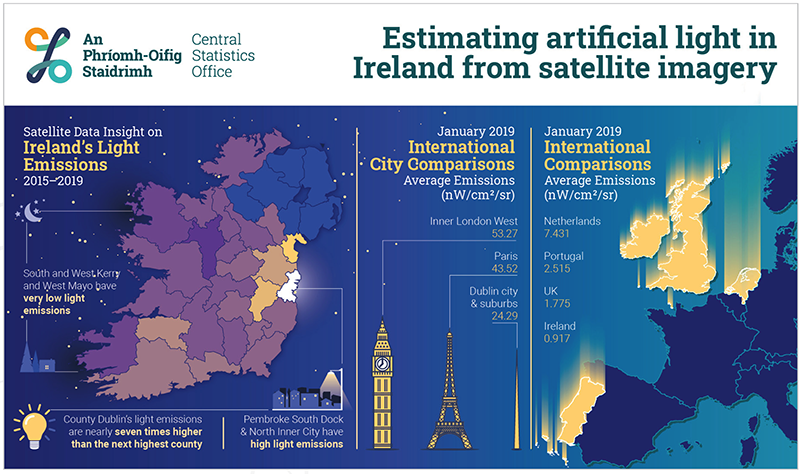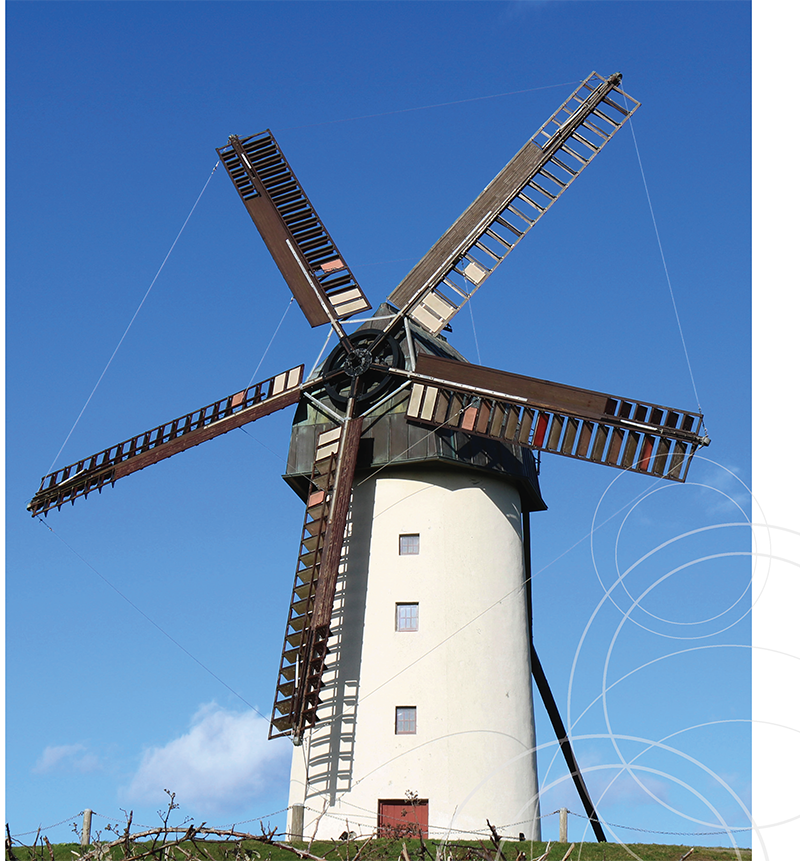Theme 7: Infrastructure & Utilities

Introduction
Fingal is committed to providing and delivering infrastructural services within its statutory remit, which will enhance the quality of the County’s environment and also facilitate the provision of well-serviced high-quality housing and economic development. This paper looks at the background and context for Water Services, Waste Management, Energy, Air, Noise, Light and Information and Communication Technology (ICT) and achievements since the adoption of the current Development Plan. The new Development Plan must put in place a framework that promotes and provides high-quality physical infrastructure to allow development to progress in a sustainable manner.
Land use planning, transportation and the provision of essential infrastructure are interdependent key components for the delivery of development, and they require an integrated approach by all stakeholders. The The National Planning Framework (NPF) acknowledges this interdependency and it is now a requirement that lands be serviced with adequate infrastructure or indeed be serviceable within the lifetime of the Plan, to be deemed appropriate for inclusion in the Development Plan.
As well as encouraging sustainable environmental infrastructure to be provided in new developments through the development management process, external stakeholders such as Irish Water (IW), the ESB and Gas Networks Ireland are formal consultees and can again influence the delivery of key infrastructure through the statutory planning process. The availability of quality infrastructure has long been recognised as critical to productivity and competitiveness and the location and delivery of both regional and local infrastructure is critical to productivity and competitiveness and the location and delivery of both regional and local infrastructure is critical to ensure that Fingal’s Settlement Strategy is successful and that its economy can thrive as part of a wider city region.
Background and Context
The provision of an adequate supply of water and wastewater facilities is crucial to facilitate and sustain the growth of Fingal and the greater Dublin area. The quantum, location and distribution of planned development must have regard to the capacity of public water services and seek to make efficient use of and maximise the capacity of existing and planned water services infrastructure. Irish Water (IW) has responsibility for the provision of water/wastewater infrastructure and Fingal will continue to work with IW and the Regional Assembly to ensure that IW’s Investment Plan fully aligns with Fingal’s Settlement Strategy.
Water supply for the wider Dublin area is at critical levels of demand and to facilitate further growth in line with NPF population growth projections, prioritisation of water supply investment should occur. IW has identified key projects for the Region which are included in Project Ireland 2040. It is essential that we have a resilient water supply to serve the existing population and for the additional 1 million people projected by 2040.
Surface water management and flood prevention remain the responsibility of the Local Authorities and the Office of Public Works (OPW). Fingal will continue to protect and enhance the County’s floodplains, wetlands and coastal areas and will support approaches to manage surface water that take account of water quantity (flooding), water quality (pollution), biodiversity (wildlife and plants) and amenity (Sustainable Urban Drainage Systems (SuDS)).
The amount of wastewater generated in greater Dublin is projected to increase by over 50% in the period to 2050. The Ringsend Wastewater Treatment Plan plant is currently being upgraded and when all the proposed works are complete in 2025, it can treat wastewater for up to 2.4 million population equivalent. The Greater Dublin Drainage Project (GDDP) is acknowledged as being another critical piece of national infrastructure and will secure the long-term sustainable growth of Fingal and the Greater Dublin Area. The GDDP will assist in Fingal delivering on its ambitious plans for the future development of the County, not just in terms of local spatial planning policy, but in also supporting consolidation of the metropolitan area, sustainable population growth, economic prosperity and continued confidence for investors in the long term.
Successful waste management strategies and policies will play an essential role in protecting public health, maintaining a high-quality environment and supporting sustainable development in Fingal and the wider eastern region. In managing our waste needs, we need to minimise waste going to landfill and maximise waste as a resource. We need to reconsider our approach and attitudes towards managing waste, with the primary focus now being to view waste as a valuable resource in conjunction with making better use of current resources as we make the transition from a linear to a circular economy.
A secure and resilient supply of energy is critical to a well-functioning region. Overreliance on non-indigenous supplies of energy is still a major issue for Fingal and the Eastern Region. In an effort to reduce our carbon footprint, it is necessary to diversify our energy production systems away from fossil fuels and towards green energy such as wind, wave, solar and biomass, together with smart energy systems and the electrification of transport fleets. In planning Ireland’s future energy landscape and in transitioning to a low carbon economy, the ability to diversify and adapt to new energy technologies is essential. Energy generation and energy related activity in Fingal is likely to change significantly over the coming years as the move to a low carbon economy increases.
Development Plan policy will continue to include measures to avoid, mitigate, and minimise or promote the pro-active management of noise, where it is likely to have significant adverse impacts on health and quality of life and existing policy will be reviewed and updated to take account of the Noise Action Plans for Dublin Airport, Fingal and the Dublin region. The need to ensure the highest standards of air quality is recognised by Fingal County Council and we will continue to engage with the EPA to monitor and improve air quality. Development Plan policy will also have regard to data on artificial light and any guidance that may issue.
Fingal is committed to the continued development and improvement of the County’s digital infrastructure and services. The widespread availability of a high-quality ICT network within the County will be critical to the development of Fingal’s economy whilst also supporting social development. The The Regional Spatial and Economic Strategy (RSES) supports actions to strengthen communications links to develop a stable, innovative and secure digital communications and services infrastructure on an all-island basis. This is a fast moving and evolving infrastructure and we need to be able to respond and adapt to future communications networks and technology along with changing work practices (such as more people working from home) and emerging economic models. Smart Grids and Smart Cities can significantly improve the efficiency and quality of complex systems such as electricity, water, waste, energy and transport services, thereby reducing their costs while contributing to the “green economy”.
Achievements since the Previous Development Plan:
Since the adoption of the current Development Plan, Fingal County Council have completed a number of flood risk management measures including works at Aspen Drive-Kinsealy, Grange-Malahide, Rolestown, Skerries, Malahide Village Green, Sutton and Portmarnock. A SuDs Guidance document ‘Green/ Blue Infrastructure for Development’ (Dec 2020), which will guide applicants in the provision of SuDs for development through the planning process .
Fingal County Council has adopted the Fingal Litter Management Plan in May 2019, which sets out our objectives for preventing and managing litter in Fingal. A key component of Fingal’s waste management policy is the development and delivery of a comprehensive education and awareness campaign, with our Environmental Educational Officer promoting Environmental Awareness Programmes within the County.
A number of new policy documents, funding proposals, targets and guidelines have been published since the adoption of the current Plan, to tackle issues that are contributing to Ireland’s greenhouse gas emissions. The Council has also facilitated the delivery of numerous gas and electricity projects providing additional energy capacity across the County in addition to upholding quality standards in respect to environmental safety, public lighting, air quality and noise management. In June 2020, we added a number of electrical vehicles to our fleet resulting in 15% of the local Authoritie's commercial fleet now powered by electricity.
Fingal has recently prepared the first Noise Action Plan 2019-23 for Dublin Airport and a separate Noise Action Plan for the County of Fingal. Fingal will continue to promote appropriate land use patterns in the vicinity of the airport flight paths and these Noise Action Plans provide guidance on the management of all environmental noise issues, whether strategic or local, regulated or unregulated.
In recent years, the Irish Government has prioritised the delivery and implementation of the EU Digital Agenda and Digital Single Market through development and implementation of the National Broadband Plan. Ireland ranks 6th out of 28 EU Member States (2020) in the European Commission Digital Economy and Society Index (DESI). Fingal’s Digital Strategy 2020-23 will encourage and support communities and businesses to reap the full rewards of a digitally enabled society.
The provision of free public Wi-Fi (which forms part of Fingal’s Digital Strategy) is currently being rolled out in our towns and villages, strengthening our reputation as a forward thinking and digitally inclusive County.
‘SMART Dublin’ & Fingal Voices App

Smart Dublin is an initiative of the Dublin local authorities, which aims to promote the Dublin region as a world leader in the development of smart city technologies. The Fingal Voices app is part of a recent collaboration between Smart Dublin, Fingal County Council and Enterprise Ireland and allows citizens to ask questions, respond to surveys and engage in dialogue with Fingal County Council departments.
SMART Balbriggan
In June 2020, Balbriggan was chosen as Ireland’s first town to be named as a Smart District in a move that will put it at the cutting edge of ‘smart’ projects to improve services, create jobs and build a better community.
The core focus of the Balbriggan Smart District will be to enhance community life, support economic opportunities and drive innovation through a number of smart district projects.
Key Issues for the Next Development Plan:
Water
Fingal will continue to liaise with Irish Water to ensure that the key projects required to facilitate growth in the County are incorporated into the strategic planning and capital investment programmes of IW. The achievement of reaching housing and population targets set by the RSES which go to make up the settlement hierarchy and associated core strategy of the Development Plan are dependent on relevant infrastructure being delivered in a timely manner.
The most important step that Fingal can take now in reducing flood risk is avoidance of development in floodplains and coastal areas subject to flooding. Design measures such as SuDS will continue to be incorporated into approval for plans and projects. Policies within the forthcoming Development Plan will ensure that new development does not lead to the pollution of ground or surface water. Conserving and enhancing water quality will also become increasingly important given the ambitious population targets and employment growth nationally and for Fingal and the wider Dublin area.
Waste
Waste capacity (for treatment, recovery, disposal, and export), continues to be a challenge and Ireland continues to depend on the export market for the recovery of residual municipal waste. Waste management planning faces many challenges from a political, policy and operational perspective, including Brexit implications for the transboundary shipment of waste and higher costs to the collection industry, which are now being passed on to customers.
Fingal will continue to facilitate the implementation of national legislation and waste management policy having regard to the waste hierarchy, including the Eastern Midlands Region Waste Management Plan (EMRWMP) 2015 -2021, which will inform the policies within the new Development Plan. The upcoming Development Plan will support a move towards achieving a ‘circular economy’ which is essential if the County and wider Eastern Region is to make better use of resources and become more resource efficient. The delivery of a comprehensive education and awareness campaign is another key element of Fingal’s waste management policy.

Energy
In Fingal, energy generation and energy related activity is likely to change significantly over the coming years as the move to a low carbon economy increases. Climate change, energy and renewable energy policies will be updated accordingly in the upcoming Fingal Development Plan. The Plan will support the inclusion of policies which promote more energy efficient development through the location of housing and employment along public transport corridors, where people can opt less energy intensive public transport, rather than being dependent on the car.
Fingal will continue to work in partnership with existing service providers to facilitate required enhancement and upgrading of existing infrastructure and networks. New energy systems and transmission grids will be necessary for a more distributed, renewables-focused energy generation system, harnessing both the considerable on-shore and off-shore potential from energy sources such as wind, wave and solar energy.
Fingal will support the development of a safe, secure and reliable supply of electricity and support the development of enhanced electricity networks, facilitating new transmission infrastructure projects under EirGrid’s Grid Development Strategy. Ireland’s direct linkages with other EU countries by both air and sea and sub-sea energy connections may become significantly more important (particularly for transport and energy infrastructure), given their advantages in terms of resilience and ease of movement across internal borders, particularly given the UK’s withdrawal from the EU.
Air, Noise and Light
The upcoming Development Plan will include policies to support the implementation of EU and National legislation on air and noise and policies will recommend the implementation of the Dublin Regional Air Quality Management Plan (or any subsequent plan) and any other relevant policy documents and legislation in order to preserve and improve air quality.
The Development Plan will also include measures to support and implement the actions included within the Noise Action Plan 2019-23 for Dublin Airport and the separate Fingal Noise Action Plan. Fingal will continue to have regard to best practice in public lighting and protect areas from light pollution and light spillage from flood lights.
Information and Communication
Technology (ICT)
The provision of a good quality high speed broadband and telecommunications service is essential for supporting and attracting business and investment. Fingal is committed to the continued development and improvement of the County’s digital infrastructure and the widespread availability of a high-quality ICT network within the County will be critical to the development of our economy while also supporting social development.
The upcoming Development Plan will include policies and objectives to promote the digital transformation of Fingal for the benefit of our society and economy, making it an even better place for people to live, work, visit and do business. Digital inclusion in Fingal will be supported by strategies that encourage wider availability of broadband infrastructure, the rollout of the National Broadband Plan and EU funding to promote digital inclusivity for all citizens.
Smart Grids and Smart Cities development will be supported, as these significantly improve the efficiency and quality of complex systems such as electricity, water, waste and transport services.
KEY QUESTIONS
- What physical infrastructure is needed to support people living, working and visiting Fingal?
- How can the Development Plan best support and promote new energy generation technologies?
- How can Fingal’s Development Plan support more innovative forms of waste treatment, waste reduction, recycling and energy re-use?
- How can the Development Plan improve digital connectivity in your area?

